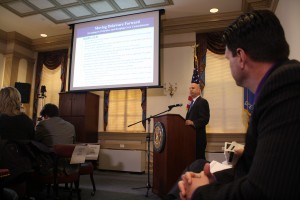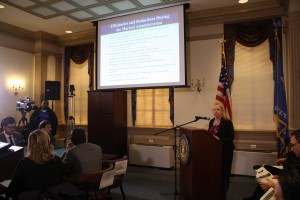Committee of Private Sector and Public Sector Leaders to Review State Spending and Identify Opportunities for Savings
Wilmington, DE – Governor Jack Markell announced today the signing of Executive Order No. 52, creating the Delaware Expenditure Review Committee. Led by Fred Sears of the Delaware Community Foundation, the Committee will review state government for opportunities to create efficiencies and provide services in a more cost-effective manner. The Committee, comprised of private sector appointees from the Governor and all four caucuses of the General Assembly, brings together representatives of the business community, unions, government and the non-profit sector.
“Delaware’s revenue sources don’t grow with our economy, so even as our state’s economy has improved, we face tremendous budget challenges,” said Governor Markell. “We must do everything we can to deliver the most value to Delawareans at a reasonable cost and the committee I’m creating today builds on six years of work to make government more efficient in providing high quality services to our citizens. The results so far have produced the least amount of budget growth during any administration – Republican or Democrat – in modern history. We must remain open to evaluating new ideas and look forward to partnering with the private sector to continue this effort.”
When accounting for inflation and population growth, the state budget has shrunk by an average of 0.58 percent per year during the Markell Administration, representing significantly less growth in spending than any prior administration in the last 30 years. That success in containing costs during a time of high demand for government services is the result of a wide range of efforts since 2009, from the Government Performance Review that generated $35 million in savings opportunities that year to additional savings through energy efficiency gains, attrition in cabinet-level agencies, pension reform, and more.
The Committee established by E.O. 52 provides an additional opportunity at an important time to fully examine other ideas to increase efficiency. This initiative complements the work of the DEFAC Advisory Council on revenues, which put together options for the state to raise revenue in a way that better reflects Delaware’s economic progress.
“This is a unique opportunity to bring together private and public sector leaders to take a look at how the State may be able to find savings,” said Fred Sears, Chairperson of the Committee. “This is not going to be easy, but I think the Governor and legislative leaders have appointed a good team that is prepared to go to work.”
“The JFC has made it a top priority to examine our budget for areas where we can save the taxpayers money while improving outcomes for everyone who relies on government services,” said Rep. Melanie Smith. “The JFC welcomes the input, time and ideas of our friends and colleagues in the private sector, and looks forward to working together.”
“The Joint Finance Committee has one of the most difficult jobs in state government – making sure that we pass a balanced budget that reflects our values,” said Sen. Harris McDowell. “Every year, we come through on that, but it isn’t getting any easier. We face difficult decision to meet the needs of Delawareans and hopefully this group can help us with those.”
“This Committee is a worthwhile endeavor and the State Chamber looks forward to working with the Administration and legislature on the Committee’s recommendations,” said State Chamber of Commerce President A. Richard Heffron.
The Committee – a bipartisan group of government and private sector leaders – includes:
- Chairman Fred Sears – Delaware Community Foundation, appointed by the Speaker of the House and designated as Chairperson by the Co-Chairs of JFC
- Fred Cottrell – Richards, Layton & Finger, appointed by the Senate Minority Leader
- Rick Gessner – Capital One, representing the Delaware State Chamber of Commerce
- Dennis Greenhouse – Former County Executive and State Auditor
- The Hon. Joshua Martin – Chairperson of DEFAC; Potter Anderson & Corroon LLP
- Robert McMurray – Christiana Care Health System, representing the Delaware Business Roundtable
- Mike Morton – Controller General
- Ed Ratledge – Chairperson of DEFAC’s Subcommittee on Expenditures; University of Delaware
- Jack Riddle – Community Bank, appointed by the House Minority Leader
- Jeff Taschner – DSEA, appointed by the Senate President Pro Tempore
- Ann Visalli – Director of the Office of Management and Budget
- Lincoln Willis – Former State Representative; Willis Chevrolet
The text of the Executive Order follows:
EXECUTIVE ORDER
NUMBER FIFTY-TWO
TO: HEADS OF ALL STATE DEPARTMENTS AND AGENCIES
RE: DELAWARE EXPENDITURE REVIEW COMMITTEE
WHEREAS, the Delaware Economic & Financial Council (DEFAC) Advisory Council on Revenues has examined the State of Delaware’s revenue portfolio and determined that more than half of Delaware’s revenue sources do not grow in proportion to the overall economy;
WHEREAS, as a result of the lack of growth among major revenue categories, total state revenues in FY 2016 are estimated to be less than FY 2015;
WHEREAS, the General Assembly and the administration have managed the State’s budget responsibly, with budgets that are balanced every year and budget growth that is only 2.3% annually during the Markell administration and that is actually negative 0.58% if adjusted for inflation and population growth during that time;
WHEREAS, the Markell administration has eliminated more than 1,000 state positions between FY 2009 and FY 2016, reduced overall head count by more than 600 employees, reduced energy costs, enacted state employee health and pension reform, reduced fleet costs, and implemented savings programs in Medicaid, Long-Term Care, and many other programs;
WHEREAS, as a result of these efforts and other budget savings, the Delaware state budget has grown less during the Markell administration than any other administration in a generation or more;
WHEREAS, even with well-managed budgets, the absence of robust revenue growth that tracks Delaware’s economy and the State of Delaware’s expenses creates an anticipated budget deficit of more than $100 million in FY 2017, and that deficit has the potential to grow as expenses continue to climb and revenue sources do not keep up;
WHEREAS, the Delaware General Assembly and Joint Finance Committee are interested in identifying opportunities for savings in the state budget and have begun efforts to identify savings through reviews by the Pew Charitable Foundation and attempts to identify savings in programs like Medicaid;
WHEREAS, the Governor and the General Assembly are committed to responsible management and administration of the state’s budget, including identifying opportunities for achieving better savings for taxpayers;
WHEREAS, a comprehensive review of state spending can identify opportunities to achieve savings in a manner that allows for the continued provision of effective service to Delawareans, particularly those who depend on government services in times of need.
NOW, THEREFORE I, JACK A. MARKELL, by virtue of the authority vested in me as Governor of the State of Delaware, do hereby DECLARE and ORDER that:
- The Delaware Expenditure Review Committee is hereby created.
- The Committee shall be comprised of twelve members. The Committee shall be comprised of the Chairperson of DEFAC, the Chairperson of DEFAC’s Subcommittee on Expenditures, the Controller General or his designee, the Director of the Office of Management and Budget or her designee, one person appointed by the President Pro Tempore of the Senate, one person appointed by the Speaker of the House, one person appointed by the Minority Leader of the Senate, one person appointed by the Minority Leader of the House, and four public members appointed by the Governor. The Co-Chairpersons of the General Assembly’s Joint Finance Committee shall designate a member from among those appointed to serve as chairperson of the Committee.
- Members of the Committee shall receive no compensation, but shall be reimbursed for customary and usual expenses incurred in the performance of their duties. The Committee shall act by majority vote and may adopt public procedures and standards for the conduct of its affairs, consistent with this Order. A quorum of the Committee shall consist of a majority of members.
- The Committee is tasked with a review of state government services to evaluate whether there are opportunities to provide government services in a manner that is more efficient, more effective, or can be performed at less cost to taxpayers. The Committee shall review any such proposals in a manner that gives consideration to both the overall cost savings that might be obtained and the positive and negative effects of those savings on the provision of services.
- The Committee is authorized to call upon volunteer assistance from its membership or other interested parties, and may retain such advisors or consultants as appropriate to assist its work. The compensation of any advisor or consultants shall be approved jointly by the Office of Management and Budget and Controller General.
- On or before January 29, 2016, the Committee shall report to the Governor and the Joint Finance Committee of the General Assembly any findings and any recommendations for the State of Delaware’s operations or budget.
- The Office of Management and Budget and Controller General’s Office shall provide staff support to assist the Committee in performing its duties and shall, upon request, provide the Committee with reports and data helpful to the Committee’s ability to perform its assigned duties. All executive branch state agencies and departments shall cooperate with the Committee when requested.
- The Delaware Expenditure Review Committee shall be terminated on June 30, 2016, if not reconstituted by further executive order.
###

